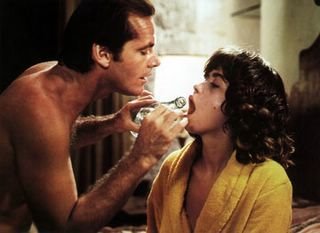Why would Locke want to escape his life so desperately? Looking at the IMDB page for the film, I see that both of the authors who have submitted plot descriptions provide their own reasons for Locke's decision, but none are provided in the film. I suppose, like the ennui that haunts the idle rich of the director's L'Avventura or the paranoid obsession driving the photographer hero of Blow Up, it's some unspeakable, indescribable desperation deep within the soul. Perhaps Locke simply hoped that the new guy's identity would be more enjoyable than his own, rather mundane, existance.
Without missing a beat, Antonioni (who co-wrote the film with Mark Peploe) moves on to another conundrum. Locke keeps all the appointments in the dead man's book, and it soon becomes clear he's some sort of arms delaer in the midst of a large deal with some shady characters. We're denied, however, any suggestion of what objects might actually be in negotiations, or what if anything Locke is actually supposed to be doing for the gentlemen with whom he meets.
Finally, Locke encounters a girl (known only as Girl, and played by Last Tango in Paris vet Maria Schneider) who decides to come with him as he keeps his appointments with destiny. Who is this girl? What is she doing wandering around Europe with mysterious strangers who admit to assuming false identities? Could she secretly be involved in the arms negotiations and even the dead man's death?

Antonioni pretends for a while that there will be answers. Unlike a lot of his other films, which drift along, contemplating the meaning of life while characters pose in front of imposing architecture, The Passenger unfolds mainly like a traditional thriller. It's probably the director's most accessible work. And yet, at heart, it's another of his explorations into the pain of boredom and the sad inevitability of life and death.
Even after it becomes clear that he's in over his head with this new identity, and that he can't control the forces that threaten him in this new life, Locke doesn't waver from keeping up appearances of becoming this different man. Why keep meeting up with gangsters and killers if he has no real business with them? Now that he's faked his own death, why not disappear somewhere far away and start over? It's almost as if Locke has an appointment with death, and he's just pausing for a brief period to have a love affair and explore scenic Barcelona.
The movie could really be interepreted in any number of ways. It feels specific and detailed, but also ambiguous. Clearly, it's analyzing the nature of identity, how a few small traits and ticks and pieces of identification essentially add up to a person. Locke and this dead man are basically interchangable commodities. So long as they provide that which is expected of them, show up at the right places at the right times with an ID card, no one cares if it's the actual same man.
And who is "The Passenger" of the title, anyway? David, who rides around Europe on another man's reputation, taking a vacation through some stranger's life? Or The Girl who joins him on his adventure? Because when we become romantically involved with someone new, it is almost like creating a new persona in which to reside, a unique entity unlike the you you'd be if you were still alone.
Despite giving a performance that embodies some of the excitable, passionate qualities for which he's known, Jack Nicholson does a remarkable job of maintaining this emotional distance. Never once betraying why he might choose to give up on his entire life (save for a frustrated road trip to get an interview with a guerilla leader early in the film), Nicholson plays Locke as a tormented man but not a whiner nor a particularly melancholy sort.
He's inhabiting a new identity, and genuinely does seem to adapt his behavior to his new personality. Only after he's spend some deal of time with the Girl do his old David Locke ways seem to reappear.
And then there's the famous final shot...By my count, it's nearly nine minutes in length, an astounding technical achievement that additionally manages to tie together all the ideas circulating throughout the film. Nicholson lies on a bed in a motel room in the foreground. The camera looks out a window, then moves through the window as we watch several mini-sequences play out on the street. No action is actually shown on screen, but the entire conclusion to the movie will play out in the audio, and everything's clear enough.
Perhaps, this final moment seems to suggest, we the audience have been the passenger all along, watching Locke adopt a senseless new identity and romance a sexy stranger for our entertainment. And, finally, Antonioni says no more and denies us any sort of satisfaction or closure. Or maybe it's jsut supposed to be an incredibly cool shot. Either way, I'm impressed.

No comments:
Post a Comment